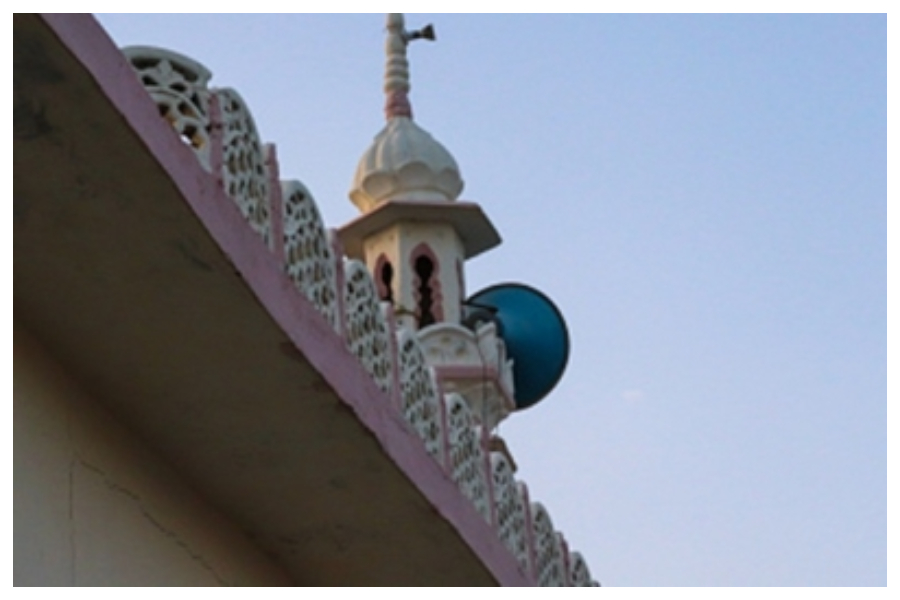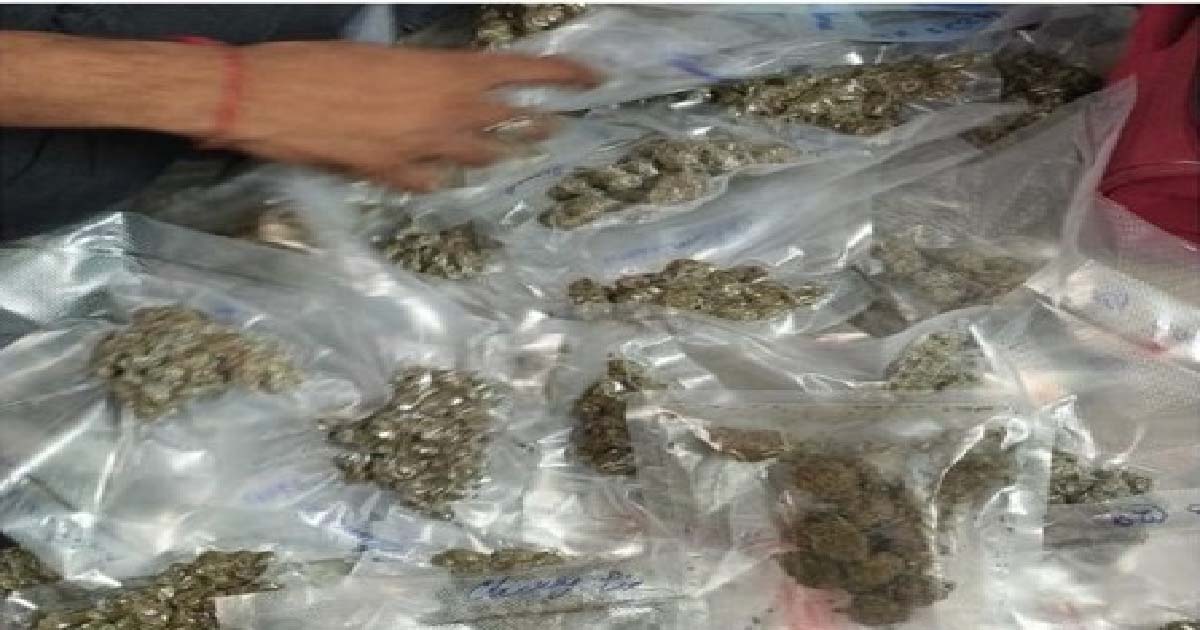Crime
Vellore tense after Hindu Munnani opposes construction of Mosque

Tension continued to grip Sarkar Mandi street in Gandhi Road and a heavy police posse has been deployed after a group belonging to the Hindu Munnai opposed the construction of a mosque at the area.
The Hindu Munnani workers alleged that the mosque was built without proper permission and that a house was converted into a mosque overnight. They claimed that the construction of mosque would lead to friction in future as there are three temples within a distance of 100m and temple processions would be taken out through the area.
Police said that the building belonged to a trader and was recently renovated and a board reading ‘Mosque’ put up. This infuriated the Hindu Munnani who petitioned the district collector of future rumblings and communal tensions in the area and added that they would not allow the mosque to function.
Vellore Superintendent of Police Rajesh Kannan, while speaking to IANS, said: “The place was used as a personal worship centre. Now they have put a board transforming it into a public worship centre. The Hindu Munnani is alleging that they do not have any proper papers for this and the revenue department is verifying the documents. Police are on vigil and will maintain law and order at any cost.”
Meanwhile, the Muslim groups met the district collector and submitted a memorandum stating that the mosque was functioning at the place since 1896 and that the Hindu Munnani was unnecessarily raking up the issue.
Dravida Muslim Munnetra Kazhagam (DMMK) leader G.S. Iqbal said: “We have petitioned the district collector stating that the mosque was in place since 1896 and that the Hindu outfit is unnecessarily creating an issue. The District collector and the RDO have gone through our petition and we expect a verdict in our favour before Friday. “
Reportedly, certain Muslim groups would resort to protest marches after the Friday Namaz if the issue is not resolved till then.
Hindu Munnani leader R. Maniswamy, while speaking to IANS, said: “We have already petitioned the District collector that commercial property is suddenly being converted into a mosque without proper documentation. Moreover, the mosque is coming up in a place where there are three temples within 100 m radius and our temple processions are taken out through this area and in future, this will lead to great friction.”
Crime
Two held with heroin worth Rs 1.5 crore in major drug bust in Delhi

New Delhi, Dec 24: In a major crackdown on drug trafficking, the Anti-Narcotics Cell of Delhi Police’s Outer North District has arrested two alleged drug peddlers and recovered 304 grams of fine-quality heroin, valued at around Rs 1.50 crore in the international market, officials said on Wednesday.
The seized contraband falls under the “commercial quantity” category under the Narcotic Drugs and Psychotropic Substances (NDPS) Act.
According to police, the arrests were made on December 21 following a specific tip-off about the movement of drug traffickers in the Narela area.
Acting swiftly on the information, a special raiding team was constituted under the leadership of Inspector Gaurav Choudhary, in-charge of the Anti-Narcotics Cell, and under the guidance of ACP Dinesh Kumar.
The operation was conducted under the supervision of DCP Outer North District Hareshwar Swami, IPS, and overall leadership of Joint Commissioner of Police, Northern Range, Vijay Singh, IPS.
“On conducting the search of their Vehicle (Shine Motorcycle bearing no. DL 5S CX 4), 304 grams of fine quality of Heroin (Commercial quantity) was recovered,” the police said in its press note.
The two accused have been identified as Taslim (23), a resident of New Seemapuri, and Salman Ansari (29), also a resident of New Seemapuri.
Taslim is a driver by profession and is reportedly a drug addict who has been involved in supplying narcotics for a considerable period. Salman Ansari, a tailor by profession, is a repeat offender and has previously been booked under the NDPS Act, police said.
Following the recovery, a case was registered at Police Station Narela under FIR No. 867/25 dated December 21, 2025, under Sections 21, 25 and 29 of the NDPS Act. Both accused were arrested on the spot, and the motorcycle used for transporting the contraband was also seized.
“Both accused persons are currently in custody, and further investigation of the case is going on to dismantle the “backward and forward” linkages of this supply chain to identify the kingpins and distributors involved in this syndicate,” said DCP Hareshwar Swami.
Crime
Delhi Police arrest female drug peddler, seize ganja and cash

New Delhi, Dec 23: In a major boost to the Centre’s ‘Drug-Free India’ campaign, Delhi Police have arrested a female drug peddler in Nihal Vihar and recovered 341 grams of ganja along with Rs 3.72 lakh in cash, suspected to be proceeds from the sale of narcotics, officials said on Tuesday.
According to Delhi Police, the action was carried out by a patrolling team of Police Station Nihal Vihar on December 20, following specific directions from the Deputy Commissioner of Police, Outer District, to maintain heightened vigilance against drug trafficking.
The team, comprising ASI Arvind, Woman Head Constable Yogita and Constable Sanjeet, was on routine patrol in the Adhyapak Nagar area when they noticed a suspicious woman standing near a house close to Pari Garden with a brown-coloured carry bag.
Police said that as soon as the woman noticed the patrol team, the crowd gathered around her dispersed, and she attempted to flee.
“On sensing the police staff, the crowd dispersed immediately, and the female carrying the brown-coloured carry bag also attempted to flee, but the vigilant team swiftly chased and apprehended her on the spot,” the police said in its press note.
Upon weighing, the contraband was found to be 341 grams of ganja. A total sum of Rs 3,72,830 was also recovered, which police believe to be proceeds from the illegal sale of narcotics.
The seized drugs and cash were confiscated on the spot following due legal procedures.
Subsequently, a case was registered at Police Station Nihal Vihar vide FIR No. 960/2025 under Section 20(b)(ii)A of the Narcotic Drugs and Psychotropic Substances (NDPS) Act. The accused woman was formally arrested in the case.
Further verification revealed that the accused has a criminal history and was previously involved in more than five cases under the Delhi Excise Act, police said.
“The Outer District police remain committed to eliminating narcotics-related crimes and safeguarding the community,” said DCP Sachin Sharma.
Crime
Mumbai Fraud: 50-Year-Old Man Booked For Duping Mulund Resident Of ₹30.50 Lakh In Fake Railway Job, SRA Flat Scam

Mumbai, Dec 22: The Agripada Police have registered a case of cheating and financial fraud against Ramesh Balu Waghchaure, 50, for allegedly duping Bhimsen Amrut Nikam, 58, a Mulund resident, of Rs 30.50 lakh by falsely promising a railway job and an SRA flat for Nikam’s son, Shubham.
In a shocking twist, the accused allegedly arranged his daughter’s marriage with the complainant’s son and assured that the money would be returned after the wedding, which never happened.
According to the FIR, Nikam currently resides with his family on Gokhale Road, Mulund (East), and had earlier lived at Rasool Jeeva Compound, Sane Guruji Marg, Saat Rasta, from 1994 to 2023. Nikam’s wife, Suman, 51, is originally from Sinnar, Nashik, and the accused Waghchaure, a resident of Pathardi Phata, Nashik, was her former classmate. The families became acquainted during a relative’s wedding in Nashik in December 2017.
After building close relations with the Nikam family, Waghchaure allegedly claimed he had strong contacts in government departments. When Shubham completed his engineering in 2017 and the family began searching for a job for him, the accused reportedly promised to secure him a post of Senior Section Engineer in the Railways. He even introduced a person identified as “Khan” and, in April 2018, collected Rs 7 lakh via RTGS for the job.
Despite repeated follow-ups till 2019, no job was provided. The accused allegedly handed over a fake railway appointment letter and later promised to return the money, which he failed to do.
Around the same time, the Nikam family was looking to purchase a house. Waghchaure then claimed he had links with an SRA project and could arrange a flat at a lower cost.
The accused allegedly took Rs 21.50 lakh in cash and Rs 1.85 lakh through NEFT for an SRA flat, claiming that construction work was underway at Kanjurmarg. However, no flat was allotted, nor was the money returned.
To further delay repayment, Waghchaure allegedly proposed that if his daughter married Shubham, the entire amount would be repaid after the wedding.
The marriage took place on December 25, 2023. However, instead of returning the money, the accused allegedly cited financial difficulties and even took an additional Rs 15,000 from Nikam in February 2024. In total, Waghchaure allegedly collected Rs 30.50 lakh under the pretext of securing a job and an SRA flat.
Realising that he had been cheated, Nikam approached the Agripada police station and lodged a complaint. Based on the complaint, police have registered a case under relevant sections of the Indian Penal Code (IPC) and have initiated further investigation.
-

 Crime3 years ago
Crime3 years agoClass 10 student jumps to death in Jaipur
-

 Maharashtra1 year ago
Maharashtra1 year agoMumbai Local Train Update: Central Railway’s New Timetable Comes Into Effect; Check Full List Of Revised Timings & Stations
-

 Maharashtra1 year ago
Maharashtra1 year agoMumbai To Go Toll-Free Tonight! Maharashtra Govt Announces Complete Toll Waiver For Light Motor Vehicles At All 5 Entry Points Of City
-

 Maharashtra1 year ago
Maharashtra1 year agoFalse photo of Imtiaz Jaleel’s rally, exposing the fooling conspiracy
-

 National News1 year ago
National News1 year agoMinistry of Railways rolls out Special Drive 4.0 with focus on digitisation, cleanliness, inclusiveness and grievance redressal
-

 Maharashtra1 year ago
Maharashtra1 year agoMaharashtra Elections 2024: Mumbai Metro & BEST Services Extended Till Midnight On Voting Day
-

 National News1 year ago
National News1 year agoJ&K: 4 Jawans Killed, 28 Injured After Bus Carrying BSF Personnel For Poll Duty Falls Into Gorge In Budgam; Terrifying Visuals Surface
-

 Crime1 year ago
Crime1 year agoBaba Siddique Murder: Mumbai Police Unable To Get Lawrence Bishnoi Custody Due To Home Ministry Order, Says Report












